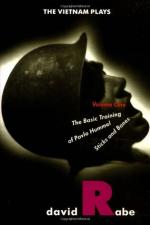
|
| Name: _________________________ | Period: ___________________ |
This test consists of 5 short answer questions, 10 short essay questions, and 1 (of 3) essay topics.
Short Answer Questions
1. Who does Hendrix say confronted two Vietnamese?
2. After the Corporal and Pavlo meet, what does Pavlo say in the barracks is so important about being a good soldier?
3. Who does Pavlo says writes to him concerning Joanna?
4. What is the name of the man whose wallet Pavlo was accused of stealing?
5. What does the Corporal say it is easy to do in Vietnam?
Short Essay Questions
1. Pavlo seems to respond to events in many different ways. Explain how his response to Pierce, when Pierce urges him to fight back, can be viewed as a highly perceptive and telling one for the audience about Pavlo's life views.
2. Pavlo believes that good soldiers are never helpless in any situation. How does this belief play out and dramatize itself in his experience with the Corporal and following scenes?
3. In this brief section of Act 2, Part 3, how is Pavlo again confronted with a vivid reminder of the destruction involved in war?
4. Choose and explore one character trait of Pavlo that is revealed in the beginning of this play.
5. How is the incident of Pavlo taking the aspirin and not waking up during the other trainees' games symbolic? How is this foreshadowing?
6. What can be deduced about Ardell's attitude and actions towards Pavlo in this part?
7. Compare and explain the relationship of Pavlo's enthusiasm for killing and what happens to Parham in Act 2, Part 4.
8. How is Pavlo's understanding of acceptable social engagement impaired? Back up your answer with examples.
9. How does the playwright use both the inconsistent plot-line and paradoxical aspects of Pavlo's character traits to create an introduction that makes the audience want to watch more?
10. Tower mentions the North Star more than a few times throughout the play, and finally in Act 2, Part 4. Up until this point, what are the possible meanings of these references to the North Star?
Essay Topics
Write an essay for ONE of the following topics:
Essay Topic 1
Identify, connect, and examine all elements of foreshadowing you can find in this play, not excluding these subjects: A) Pavlo's death (2x's) B) Pavlo's failure with women C) Pavlo's helplessness. Combine all moments of foreshadowing and use them to make your own opinions about Rabe's style and use of foreshadowing.
Essay Topic 2
As soon understood by the audience, scenes take place in different time frames, places, and even on different planes of existence; such as Pavlo being alive or Pavlo being dead. How is this narrative structure key to appreciating the play's style? Consider the phrase "the whole is more than the sum of its parts," and sum up your findings about the style of this play using this phrase to support your answer.
Essay Topic 3
In terms of Pavlo's innocence about people, again we see in this scene that his he does have compassion for his fellow soldiers. However, his methods of going about connecting with his fellow soldiers don't have anything to do with who they are. It's all about what he, Pavlo, feels and believes. His attitude is centered in the common enough desire to be liked and respected and above all seen as an individual with value. This is connected to his desire for an identity. If he's seen, for example, as someone with a colorful family or a colorful history, that defines him and gives him an identity. Explain by citing examples from the play how Pavlo's ego-centrism gets in the way of all of his goals and desires to become the man he wants to become.
|
This section contains 2,181 words (approx. 8 pages at 300 words per page) |

|




